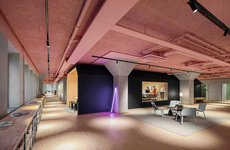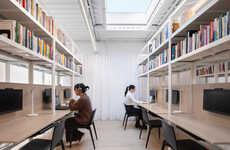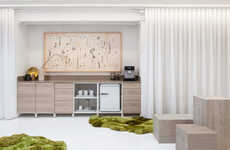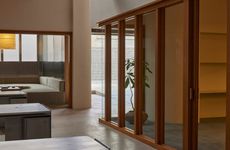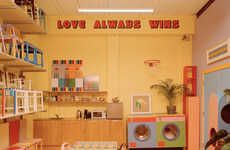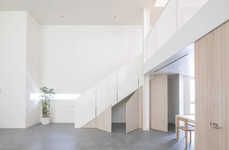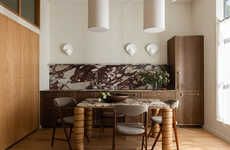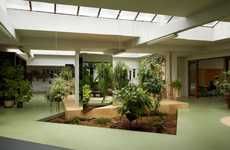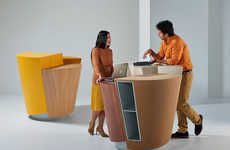
Dash Marshall Creates an Alternative Work Environment
Vasiliki Marapas — July 29, 2014 — Art & Design
References: dashmarshall & dezeen
Architecture firm Dash Marshall renovated a former pencil factory into a collaborative workspace for the 'Makeshift Society,' a community of creative freelancers. The community is comprised of architects, designers, photographers and other creative professionals who are without their own permanent work environments.
The architects used a stripped-back approach, leaving exposed concrete throughout the offices and white-washing the walls. Architect Ritchie Yao explains, "We made an effort to keep the texture of the factory by leaving the original cast concrete walls and columns exposed."
The furnished spaces throughout are left ambiguous, allowing workers to decide what function they carry out at any given moment. A maple wood counter provides members an opportunity to stand as they work, illuminated by pendant lamps suspended from the five-meter-high ceiling.
The architects used a stripped-back approach, leaving exposed concrete throughout the offices and white-washing the walls. Architect Ritchie Yao explains, "We made an effort to keep the texture of the factory by leaving the original cast concrete walls and columns exposed."
The furnished spaces throughout are left ambiguous, allowing workers to decide what function they carry out at any given moment. A maple wood counter provides members an opportunity to stand as they work, illuminated by pendant lamps suspended from the five-meter-high ceiling.
Trend Themes
1. Collaborative Workspaces - Collaborative workspaces are becoming a trend as more freelancers and creative professionals seek affordable alternatives to traditional office spaces.
2. Flexible Work Environments - Designing flexible workspaces, with malleable furniture and open-plan spaces, can help to create a more dynamic and agile work setup.
3. Industrial Minimalism - Industrial minimalist design is becoming increasingly popular, with a focus on leaving raw or stripped-back features visible to create a distinct aesthetic.
Industry Implications
1. Architecture - The architecture industry can explore more opportunities to design flexible, collaborative workspaces that cater to freelancers and remote workers.
2. Furniture Design - Furniture designers can create malleable and adaptable workstations and seating options that can be customized for a variety of uses.
3. Real Estate - Real estate professionals can identify under-utilized spaces and refurbish them into new, inviting work environments for freelancers and remote workers.
3.9
Score
Popularity
Activity
Freshness


